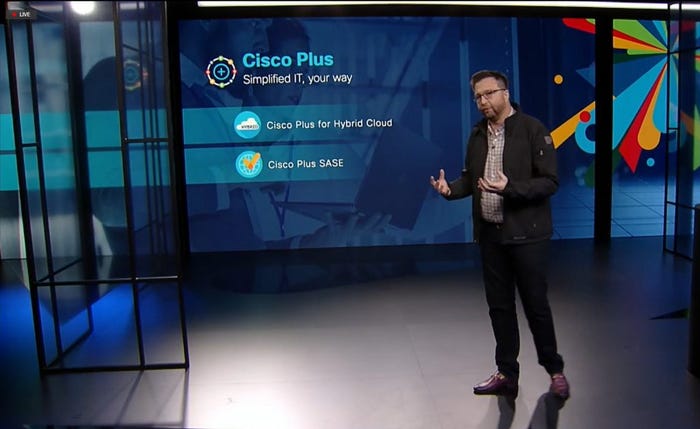Cisco Readies Usage-Based Network-as-a-Service Offering with Cisco PlusCisco Readies Usage-Based Network-as-a-Service Offering with Cisco Plus
Expect Cisco Plus Hybrid Cloud to debut by midyear.
April 1, 2021

Cisco will start offering its network, security and management solutions as a service with the debut of Cisco Plus. The new consumption-based solutions, announced at the Cisco Live virtual conference, will start rolling out this summer.
The move promises to initiate a major shift in the delivery of enterprise network infrastructure by the industry’s largest provider. Instead of providing its hardware and software for purchase, Cisco will offer what it calls its network-as-a-service (NaaS) model, with usage-based pricing. Cisco said it will provide unified subscriptions across compute, storage, network, security, cloud and application management architectures.
Todd Nightingale, general manager of Cisco’s enterprise networking and cloud business, introduced Cisco Plus during the Cisco Live keynote session.

Cisco’s Todd Nightingale at Cisco Live!
“Cisco Plus delivers complete, flexible solutions as a service, Nightingale said. “Cisco Plus is not just hardware as a service or software as a service; [it] is focused on outcomes and experiences. It’s brought to you by Cisco and built from, and backed by the technology teams and the promise of Cisco.”
Cisco Plus is cloud-native and is designed to provide agile service delivery.
“And it comes with a new observability experience that can help our users understand what’s really happening in their infrastructure,” he said.
Initially, the company will offer Cisco Plus Hybrid Cloud. It consists of Cisco’s data center compute, networking and storage portfolio as a consumption-based service. Cisco will also include third-party storage, though it didn’t disclose any suppliers. Cisco will offer it through a self-service portal via its Cisco CX Cloud.
The next offering in the pipeline will be the new Cisco secure access service edge (SASE). Also launched Tuesday at Cisco Live, the expanded Cisco SASE is a cloud-native security solution. It provides a protection for endpoints, data loss prevention, cloud malware detection, an expanded SD-WAN solution with Viptela, observability based on its recent acquisition of ThousandEyes, and password-less authentication.
Potential for Disruption
It remains to be seen whether the economics and flexibility of Cisco Plus are comparable with other cloud and SaaS models. But company officials emphasized that with the increase in remote and hybrid work environments, expanded implementations of IoT solutions are accelerating demand.
Cisco Plus is poised to upend how users buy the company’s solutions, and how partners sell them. The particulars of how Cisco Plus will impact how partners get compensated remain to be seen. Asked about that during an analyst and press briefing, Cisco CEO Chuck Robbins said he has navigated major shifts before.
“Having been deeply involved in the partner programs over the years, it’s a constant change that we have to deliver,” Robbins said. “The short answer is, we’ll continue to evolve our programs to make sure that our partners are included and part of our value chain. We think that it’s super important to us going forward. Does that mean 100% of everything? No, but we’ll continue to make sure that’s the case. We have partners that will be ahead of us, we have partners that will go with us and we will have partners that will lag; they tend to move at different paces.”
Industry analyst Maribel Lopez of Lopez Research, who posed the question to Robbins, said the introduction of Cisco Plus was …
… essential.
“It’s 2021, and if you don’t have an as-a-service offering, then you’re missing the boat,” Lopez told Channel Futures. “Every single tech vendor has some format of how they are offering as-a-service offerings.”
Lopez added that Cisco is slightly behind the curve in making this shift. But the pandemic has resulted in a growing number of customers wanting more flexibility going forward. Cisco pressed hard on that theme, noting, like others, that hybrid work is here to stay. As a result, organizations need more adaptable networks.

Lopez Research’s Maribel Lopez
“The cloud computing guys drove this pretty hard,” Lopez said. “And it’s been embraced. And it became very clear that every part, every product stack was going to end up being an as-a-service stack as well. The good news now is that Cisco is going to be in game. They didn’t have to invent the wheel around as-a-service. And they can come in and try to take their spin on it and make it their own.”
Analyst Janet Schjins, president of JS Group, compared Cisco Plus to how customers pay for their smartphones.
“You ask somebody how much they pay per month for cell service, and they say $300 per month, but that includes two or three iPhones for the family,” she said. “I think Cisco is just going for a network as a service and a cloud model using that same consumer behavior. Ultimately Cisco, and everyone else, are going to offer most of their products as a service.”
Nevertheless, it will be disruptive to partners, particularly those who deploy hardware, Schijns added.

JS Group’s Janet Schijns
“I think it’s going to be difficult for channel partners that have long sold discount as their No. 1 benefit,” she said. “And we haven’t yet heard with this flexible consumption model, network as a service, how exactly is the channel engaged. How does the channel get paid? How does the channel sell it?”
Cisco Plus Channel Strategy Specifics TBD
Given that the Cisco Plus Hybrid Cloud offering isn’t set to arrive before midyear, the company may still be assessing those details, Schjins said.
“Clearly, they have to figure out the channel strategy,” she said. “As everybody is struggling right now, with how do you distribute technology as a service?”
Indeed, CEO Robbins indicated that the company is still working through those issues. Using the Cisco Plus Hybrid Cloud offering as an example, Robbins said, “When you have compute, and you have networking built into it, that’s a completely different way of thinking about how you how you actually monetize it.”
Cisco Plus will benefit partners by addressing customer demands, according to a post by Alexandra Zagury, Cisco’s VP of partner managed services and SaaS sales.
“Customers are asking partners to not only integrate Cisco solutions, but to also deliver and operate them with managed services,” Zagury noted. “So it’s no surprise that partners want further alignment with Cisco to meet the need for as-a-service IT. If you already have an as-a-service or managed-services practice, then the journey we’re taking to build Cisco Plus accelerates your opportunity.”
Many of Cisco’s partners have already adapted to consumption-based services, Schjins said.
“I have the greatest confidence that Cisco will find a way to ensure that the channel will continue to make money,” she said. “They don’t make major missteps like that, which might be why they were so cautious about what they have said so far.”
About the Author
You May Also Like


